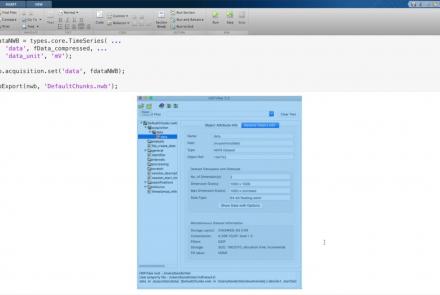This lecture provides a history of data management, recent developments data management, and a brief description of scientific data management.
Difficulty level: Advanced
Duration: 35:10
Speaker: : Thomas Heinis
This lesson gives a presentation on computationally demanding studies of synaptic plasticity on the molecular level.
Difficulty level: Advanced
Duration: 15:44
Speaker: : Kim "Avrama" Blackwell
Course:
This talk presents several computationally demanding studies of synaptic plasticity on the molecular level.
Difficulty level: Advanced
Duration: 15:44
Speaker: : Kim "Avrama" Blackwell
In this lesson you will hear about several computationally demanding studies of synaptic plasticity on the molecular level.
Difficulty level: Advanced
Duration: 15:44
Speaker: : Kim "Avrama" Blackwell
Course:
This lecture presents an overview of functional brain parcellations, as well as a set of tutorials on bootstrap agregation of stable clusters (BASC) for fMRI brain parcellation.
Difficulty level: Advanced
Duration: 50:28
Speaker: : Pierre Bellec
This lesson provides instructions on how to build and share extensions in NWB.
Difficulty level: Advanced
Duration: 20:29
Speaker: : Ryan Ly
Learn how to build custom APIs for extension.
Difficulty level: Advanced
Duration: 25:40
Speaker: : Andrew Tritt
This lesson provides instruction on advanced writing strategies in HDF5 that are accessible through PyNWB.
Difficulty level: Advanced
Duration: 23:00
Speaker: : Oliver Ruebel
This lesson provides a tutorial on how to handle writing very large data in MatNWB.
Difficulty level: Advanced
Duration: 16:18
Speaker: : Ben Dichter
Course:
This lesson provides an introduction to biologically detailed computational modelling of neural dynamics, including neuron membrane potential simulation and F-I curves.
Difficulty level: Intermediate
Duration: 8:21
Speaker: : Mike X. Cohen
Course:
In this lesson, users learn how to use MATLAB to build an adaptive exponential integrate and fire (AdEx) neuron model.
Difficulty level: Intermediate
Duration: 22:01
Speaker: : Mike X. Cohen
Course:
In this lesson, users learn about the practical differences between MATLAB scripts and functions, as well as how to embed their neuronal simulation into a callable function.
Difficulty level: Intermediate
Duration: 11:20
Speaker: : Mike X. Cohen
Course:
This lesson teaches users how to generate a frequency-current (F-I) curve, which describes the function that relates the net synaptic current (I) flowing into a neuron to its firing rate (F).
Difficulty level: Intermediate
Duration: 20:39
Speaker: : Mike X. Cohen
This lecture explains the concept of federated analysis in the context of medical data, associated challenges. The lecture also presents an example of hospital federations via the Medical Informatics Platform.
Difficulty level: Intermediate
Duration: 19:15
Speaker: : Yannis Ioannidis
This is the first of two workshops on reproducibility in science, during which participants are introduced to concepts of FAIR and open science. After discussing the definition of and need for FAIR science, participants are walked through tutorials on installing and using Github and Docker, the powerful, open-source tools for versioning and publishing code and software, respectively.
Difficulty level: Intermediate
Duration: 1:20:58
Speaker: : Erin Dickie and Sejal Patel
This lesson describes the fundamentals of genomics, from central dogma to design and implementation of GWAS, to the computation, analysis, and interpretation of polygenic risk scores.
Difficulty level: Intermediate
Duration: 1:28:16
Speaker: : Dan Felsky
This is a hands-on tutorial on PLINK, the open source whole genome association analysis toolset. The aims of this tutorial are to teach users how to perform basic quality control on genetic datasets, as well as to identify and understand GWAS summary statistics.
Difficulty level: Intermediate
Duration: 1:27:18
Speaker: : Dan Felsky
This is a tutorial on using the open-source software PRSice to calculate a set of polygenic risk scores (PRS) for a study sample. Users will also learn how to read PRS into R, visualize distributions, and perform basic association analyses.
Difficulty level: Intermediate
Duration: 1:53:34
Speaker: : Dan Felsky
This lesson contains the slides (pptx) of a lecture discussing the necessary concepts and tools for taking into account population stratification and admixture in the context of genome-wide association studies (GWAS). The free-access software Tractor and its advantages in GWAS are also discussed.
Difficulty level: Intermediate
Duration:
Speaker: : Dan Felsky
This lesson is an overview of transcriptomics, from fundamental concepts of the central dogma and RNA sequencing at the single-cell level, to how genetic expression underlies diversity in cell phenotypes.
Difficulty level: Intermediate
Duration: 1:29:08
Speaker: : Shreejoy Tripathy
Topics
- Artificial Intelligence (1)
- Notebooks (1)
- Provenance (1)
- DANDI archive (1)
- EBRAINS RI (6)
- Animal models (2)
- Brain-hardware interfaces (1)
- Clinical neuroscience (23)
- General neuroscience
(17)
- General neuroinformatics
(12)
- (-) Computational neuroscience (83)
- Statistics (5)
- (-) Computer Science (5)
- (-) Genomics (8)
- Data science
(9)
- (-) Open science (5)
- Project management (1)
- Education (1)
- Neuroethics (5)

















